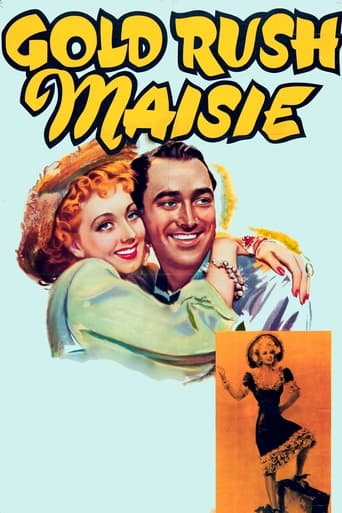mark.waltz
Molested by a tumbleweed as the coyotes howl, stranded Maisie faces being stuck in the middle of nowhere as she heads towards a singing job. Unfortunately, she never makes it, her car unfixable and the thought of a nearby gold rush tempting her to stay. Grizzled Lee Bowman gives her a hard time and you know romance may blossom because well, fighting men and women are really lovers in denial, at least in these old MGM comedies, especially when sassy Ann Sothern is involved. As usual, Sothern's Maisie takes over in solving everybody's problems in record time, moving on just like Dorothy after saving Oz from those wicked witches.Sothern plays the role with much empathy as well as humor, showing she can hold her own with Bowman, yet with just a minimal shake of her head shows her sympathy for struggling mother Mary Nash whose daughter Virginia Wiedler she had earlier befriended. It's nice to see Nash in a sympathetic role, having been notoriously cruel to Shirley Temple in "Heidi". That old hound dog, Slim Summerville, plays Biwman's crabby companion, creating laughs simply by being miserable. It's a combination of comedy and drama, the funny scenes classic, and the dramatic elements as forced as those in MGM's other series, that one concerning the Hardy family. Still, there's no beating Maisie, pick in hand, taking a crack at mother earth
MartinHafer
This is the third of eleven Maisie movies MGM made with Ann Sothern. Maisie's character seems a lot like Dr. Kimbell in "The Fugitive" because each of the films finds Maisie moving on to yet another locale. In "Gold Rush Maisie", this dancer has been hired for a job in some dive in the middle of the desert. However, hr car breaks down on the way and she's forced to stay with a couple misanthropes who live in the desert. Lee Bowman and Slim Summerville play Bill and Fred--two angry guys who hate everyone and treat Maisie like a leper for bothering them. She eventually does leave and assumes she'll never be back to see these grumpy guys. However, later she meets up with a homeless family living in their car and traveling to some supposed gold strike--hoping to try their luck. Naturally, this takes them back to the property owned by the grumpuses--Bill and Fred. Can Maisie's winning personality win over these grouches or is there some deep dark secret and that's why they don't want them on the land. Well, the latter turns out not to be the case--they just hate everyone and Maisie MIGHT be able to do something about this and help the starving families at the same time.This is an interesting movie because it's one of the few from the era that acknowledges that there IS a Depression! In so many Hollywood films of the time, the characters are rich or at least middle class and quite unaffected by the hard economic times. This is good. However, I felt angry because I assumed there was some secret for why Fred and Bill were so nasty. But, instead, it was a bit like a sappy version of "How the Grinch Stole Christmas" where Maisie melts their hearts and save the day. Yick. It's fair but sappy entertainment and no more.
bkoganbing
Gold Rush Maisie finds Ann Sothern as the good hearted show girl from Brooklyn going out west with a family that looks remarkably like Joads of Oklahoma. All that was missing was Henry Fonda.In fact the subject matter was just like The Grapes Of Wrath. Uprooted farmers moving about the country looking for odd jobs in crop picking. Only here rumors of a gold strike are sending a bunch of them west to the Arizona desert. After a bit of kindness on Maisie's part, she hooks up with the Davis family which consists of parents John F. Hamilton, Mary Nash and kid Virginia Weidler, Scotty Beckett and an infant.All the same problems that John Ford so graphically illustrated and John Steinbeck so graphically wrote about are present in Gold Rush Maisie. Pity that no one with a head as level as Maisie's was around in The Grapes Of Wrath. Many social problems would be solved.Who'd have thought a film of social significance would have come from the Maisie series, but it did.
blanche-2
"Gold Rush Maisie" has Maisie (Ann Sothern) prospecting in this 1940 entry into the series. Maisie's car breaks down, and she becomes stranded and has to ask for help from an isolated, nasty rancher (Lee Bowman) who shares his house with another sourpuss (Slim Somerville). These films all followed the same formula - Maisie's charm, no-nonsense attitude and warmth melt the icebergs she meets. Later on, she meets a family of farmers who have lost their farm and become migrant workers. Now they're on their way to prospect for gold. Maisie is stunned at how little they have and sets out to help them.The atmosphere of "Gold Rush Maisie" is a little more down than usual, and the actions of the rancher played by Lee Bowman are inexplicable. First he's nasty, then he abruptly puts the moves on Maisie, becomes nasty again and later, after she tells him off, he becomes nice. Bowman was Sothern's leading man in the series more than once, as was James Craig - I prefer James Craig, who had more energy and variety in his acting.One does really feel for the family, and that helps to hold one's interest. Sothern does her usual bang-up job. The previous reviewer has it right - she would have been a bigger star in an earlier era. But if huge movie stardom eluded her, she still played some wonderful roles, and her two series are a treasure, as is the actress herself.


